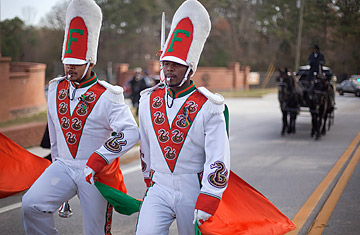
Members of the Florida A&M University band at a funeral for fellow band member Robert Champion, Nov. 30, 2011 in Decatur, Ga.
Florida Governor Rick Scott didn't exactly endear himself to the African-American community earlier this year when he told black state legislators, "I grew up probably in the same situation as you guys. I started school in public housing. My dad had a sixth-grade education." And Scott did it again last Thursday, Dec. 15, while talking to black students who were protesting his call to suspend the president of Florida A&M University (FAMU), the state's only publicly funded historically black college, until officials finish an investigation into last month's alleged hazing homicide of a member of the FAMU marching band. "I come," the conservative multimillionaire governor felt compelled to remind them, "from public housing."
Aside from its implication that all African Americans hail from the projects, Scott's remark was a reminder that race, fairly or not, hovers over the FAMU hazing tragedy that has made national headlines since Robert Champion, 26, a drum major for the university's famed Marching 100, died Nov. 19 in what officials now say was a homicide. His killing, allegedly by other band members during a brutal beating ritual, has intensified calls for FAMU to confront a long and entrenched tradition of physical hazing at the school. It's a problem shared by other historically black colleges, and many African-American leaders and scholars say it goes back as far as the era of slavery. There is a "pent-up urge to be dominant over somebody," says former state senator and FAMU alumnus Al Lawson of Tallahassee, the state capital, where FAMU is located.
That's an uncomfortable discussion for a community like FAMU's, popularly called Rattler Nation, which overcame harsh Jim Crow discrimination and neglect to make its school a topflight institution — it was named College of the Year by TIME in 1997. FAMU's seeming denial of the problem stems in large part from a fear that admitting it might invite renewed racial disparagement from the outside world. "There is certainly an us-vs.-them feeling that there are forces out there that would love to use something like this to write us out of existence," says veteran FAMU journalism professor Joe Ritchie. "But we've got to pull our heads out of the sand, talk about it and solve it."
At the same time, Scott's recommendation to FAMU's board of trustees last week that university president James Ammons be suspended, as well as the announcement of an investigation into possible financial misconduct at the school related to the marching band, has many FAMU loyalists asking whether the governor would have called for similar action at any of Florida's other 10 state universities. Scott assured FAMU students demonstrating outside the governor's mansion Thursday that there was no bias involved. "I care about what happens to FAMU," he said.
Still, state senator and FAMU alumna Arthenia Joyner of Tampa says she fears there is an unspoken double standard. "FAMU has always been the stepchild of the Florida university system," Joyner argues. "Suspending Ammons gives the impression that he personally has done something wrong and that the governor is saying, 'I'm gonna straighten out this black institution.' " As for the financial probe, Lawson, who attended a meeting between Scott and Ammons on Friday, suggests FAMU "may be scrutinized more than any institution in the state" in part because it's a historically black college.
Others contend the opposite — that FAMU, starting at the end of the civil rights movement in the 1970s, has received less scrutiny from the state because politicians and education officials fear accusations of racism. In 2007, when FAMU's finances were in disarray and the school temporarily lost its its accreditation from the Southern Association of Colleges and Schools, Steve Uhlfelder, a former chairman of Florida's university regents and the recipient of a special FAMU award for service to the school, conceded that "we didn't look at [FAMU] the same way we did other universities. We were very sensitive to ... past discrimination [and] the criticism we received if we came down on them too hard." Other regents voiced the same concern. In 2004, James Corbin, then chairman of FAMU's board of trustees, made a similar point: "We were not held, in my opinion, to the same kind of rigorous standards as the other universities."
